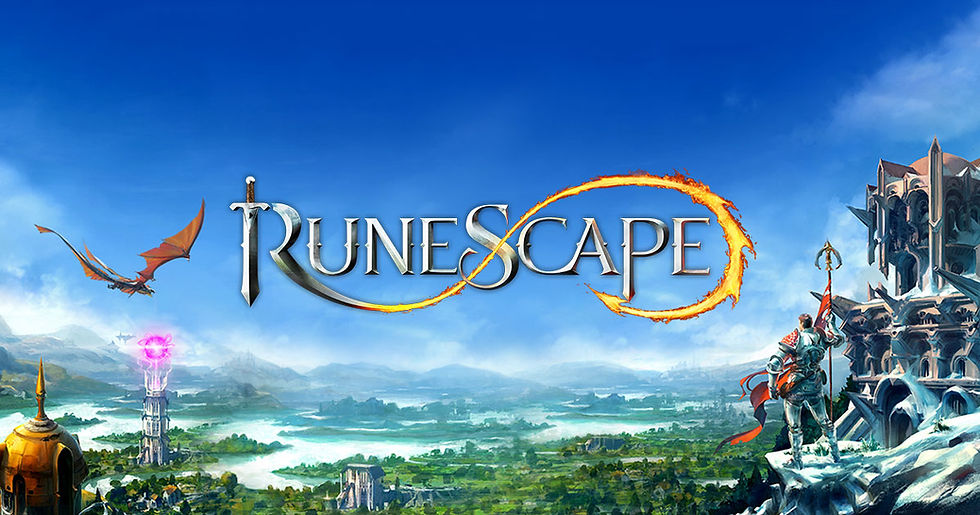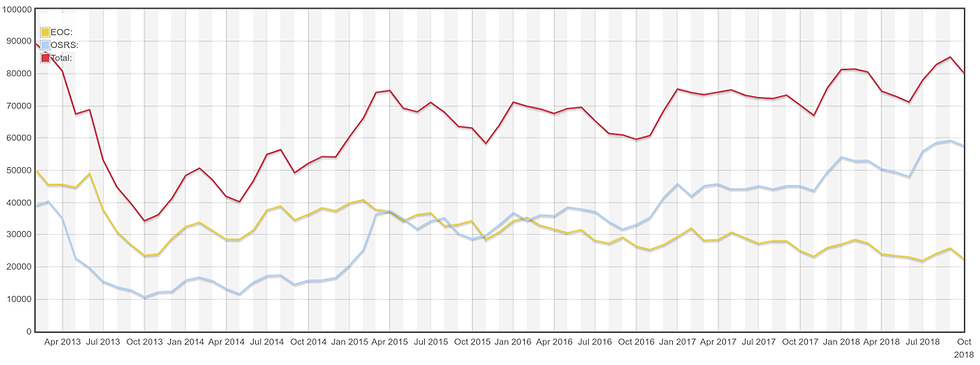Game Review: Runescape
- Daniel Solnik
- Oct 19, 2018
- 4 min read

Runescape is a fantasy MMORPG or massively multiplayer online role-playing game for PC in which players take the role of a hero, slaying monsters, completing quests or training to develop various skills. Jagex, the “Java Game Experts”, developed the game that boasts over 250 million created accounts[1]. It is a point and click game, where players can own items, trade, and talk to other players and non player characters in a world with 2,000 other players, while training in any of 20 plus skills to the maximum level.
However, there isn’t just one Runescape. There are two versions of the game: Old School Runescape and Runescape 3. Runescape initially was a single game released in 2001 with an in-browser Java app called Runescape. However, numerous controversial and game-changing updates consisting of, but not exclusively, Runescape 2 and Runescape 3, diminished the player base and left many old players feeling alienated. On February 15, 2013, Jagex released a poll to gauge interest in a re-release of Runescape the way it was in 2007 before many of the most unpopular updates. After 449,351 votes in favor of a return to an older version, Old School Runescape was born.

Old School is a grind. A large part of the game is repetitive action. Players cut trees over and over to get woodcutting experience. They kill the same monsters again and again to gain combat experience. There isn’t much variety to these actions either, as the point and click mechanics of the game means the player points and clicks repetitively at the same place. Levels get exponentially harder as one approaches the max level, to the point where the amount of experience needed to surmount the last eight levels (92-99) is the same as those needed to surmount the first 91 (1-91). It might take hundreds of hours of gameplay to achieve the maximum level. When a player finally levels up, there are brief, easy-to-miss fireworks that go off on top of the player’s character.

The grind doesn’t feel boring. In fact, it feels soothing. Wherever you are, it always feels like there are three other players working towards the same goal. As you chop away at the oak tree and walk to the next spawning oak tree, you’re greeted by the characters of dozens of other players moving with you, a sea of players leveling up their characters, a sea of players advancing. You might not talk to them, but you know they know you’re there and that you’re working toward the same goal. There’s something magical and even soothing about this. In Runescape, you’re part of a community that constantly betters itself, or appears to, wherever you are.
Recently, Runescape introduced new game-modes under a category called ironman, where a player is restricted from trading with other players and has limited bank usage. This might seem like it would alienate players, yet it has done just the opposite. Ironmen, joined together against these hardships, form a strong subcommunity. Those playing in this game mode are identified by a helmet in addition to their name. When they talk and throughout their travels, ironmen track down and share secrets and experiences with each other to progress through their collective journey through this new game mode.

This community is the reason that Old School Runescape regularly has more than twice as many players online as Runescape 3. Old School Runescape was created by a vote from the players and has centered upon iteration with player feedback. Old School Runescape gives users the final decision when it comes to features, no matter how small or large they may seem. The game empowers the players and gives them some control over the community. It is not just a game that they play, but gives them a stake and sense of ownership. There are weekly polls in which any member, provided they fulfill some modest requirements, can participate and vote for or against a proposed feature. Players feel connected to each other and the game developers as they exercise their voice. Old School Runescape has retained and cultivated a community since 2013 and learned from the failures of Runescape 3, whose iteration alienated players.

Old School Runescape also is a competition with very clearly defined goals and rules. Players can see exactly how much experience they are receiving when they complete an action as well as how much is left to their next objective. In Runescape, players are always moving forward and no time spent training is ever wasted. Even if players only spend a half hour playing, they move a half hour closer to their goal. This transparency isn’t present in many other games, where completing a level might take hours if one gets stuck on a puzzle. This transparency adds another dimension to the game. You monitor your progress as you work towards your goal, seeing a clear line progression the whole way. When you complete a goal, you know exactly how much time you’ve put in. Gaining levels truly feel like an achievement, where the time and work put in is clear and real, whereas in many other games achievements might seem sporadic or undeserved.
Runescape is a game that centers around grinding, but is rewarding and comforting. Through analyzing Runescape, we can see the importance of community to game experience and the sense of belonging it can create. Additionally, we see the effect that the transparent, repetitive training mechanic has on the player experience and the profound sense of achievement this permits. Runescape is a game that rewards those who put in the time with a sense of achievement and belonging. Even if players may click as they sit alone, the game itself gives them a sense of community. That intangible benefit is as much a source of the game’s success as the very structure and substance of the game.
Sources:
“First Impressions of RuneScape 3 from a Returning Player.” Engadget, www.engadget.com/2013/08/14/first-impressions-of-runescape-3-from-a-returning-player/.
“Most Users of an MMO Videogame.” Guinness World Records, www.guinnessworldrecords.com/world-records/105537-most-users-of-an-mmo-videogame.
“Old School RuneScape Wiki.” Old School RuneScape Wiki | FANDOM Powered by Wikia, oldschoolrunescape.wikia.com/wiki/Old_School_RuneScape_Wiki.
Runescape Population Avg by Month, www.misplaceditems.com/rs_tools/graph/?display=avg&interval=month&total=1.


As an avid Old School Runescape player (and a less avid RS3 player), it's great to see that you wrote about Runescape! I think the focus on the community as to why Old School has seen so much success is right on. The community is part of what makes the grind fun, and the grind helps the players create their tight-knit community. I think something to consider is why RS3 seems to sometimes struggle in creating that same community. That's not to say that RS3 is completely lacking in committee - I just don't think it's as strong.
What really strikes me as different between Old School and RS3 is that RS3 has removed a lot of the grind. In…
Hi Daniel! Really cool that you wrote about Runescape, the old school version of which is actually my favorite game! The community that is created by 'bettering oneself' through the grind was one of my favorite aspects of the game and I think an interesting comparison point between Runescape and other MMOs like World of Warcraft. I could be way off-base here, but I found that the wide array of skills that one could train in Runescape (everything from woodcutting to "slayer" to herblore), along with the fact that leveling those skills is a requirement for many quests really sets the game apart from something like WoW, where you are forced to specialize in a skill (from what I remember).…